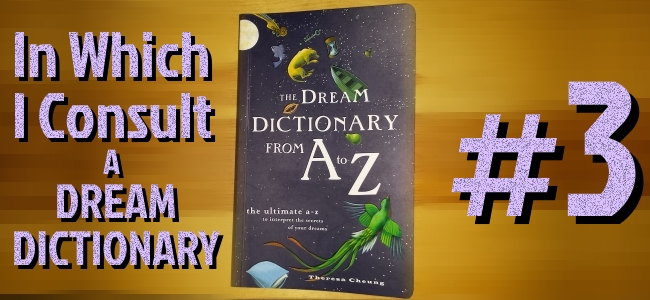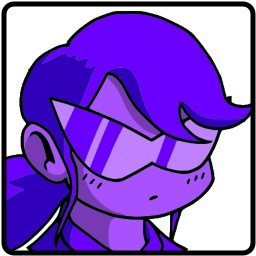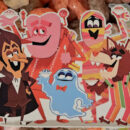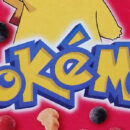Though my waxen wings were singed from the previous affair, like Icarus, I flew onward. I had to be a douche. I had to push the merits of The Dream Dictionary From A to Z (by Theresa Cheung!) to its limits.
If you haven’t read them yet, please read the first and second articles in this series, or you’ll be missing the overarching narrative, and what’s the point in doing that?
Dream C – The Art Exhibit
I thought long and hard about this. I could try another generally coherent dream like Aeons, but where would be the fun in that? Nope, it’s time to go for broke with one of the most obtuse, nonsensical messes that my sleeping mind has ever conjured up. In a twist that should leave no one surprised, it was a dream about art.
The Art Exhibit (Dream Log #18, 2014)
Where do I even begin with all the convoluted bullshit in this dream? This time around, I’m ordering it all chronologically instead of alphabetically. There’s just too much here.
- Fairground
- Loneliness
- Light
- Art
- Airport
- Guide
- Crowd
- Children
- Bathroom
- Music
- Machine Malfunction
- Rust
- Wheelchair
- Water
- Flying
- Landscape
- Accident (crashing in tree)
- Waking Up
This is going to be a long one.
Fairground
The most I could glean from this one was that I need to let loose my inner child. Most of the entry was about rides and pleasures and whatnot, which didn’t really feature in the dream (196). I can’t foresee any of this having anything to do with the rest of the dream, so I’m inclined to just discard it… But I guess it is strange that the setting of my dream is something exclusively from my childhood, a time which I’d rather leave in the past.
Loneliness
It’s not so much the topic of loneliness as it is the fact that I abandoned my party to embark on this surrealistic journey. This just comes back to the excerpt I gleaned in the first entry, which stated: “To dream that you are alone in a crowd may imply that you are isolated from those around you, while being alone in a landscape may suggest that you prefer to make decisions by yourself” (325). However, in the vast, middle portion of the dream, I’m being led through a crowd by another person, so… is that supposed to imply that my unconscious mind wanted to go against that mentality? But if that were the case, then why did it feel more like I was in control, following the guy to his own surprise? I don’t know, some of this stuff seems a little obtuse and probably meaningless.
Light
“If you are carrying a flashlight or torch in your dream, this suggests you are trying to seek out truth and integrity in a corrupt situation” (323). Well, my flashlight was dim, and I couldn’t see shit, so what does that say? Huh? Honestly, I can’t remember what was going on in my life back when I had this dream, so I can’t properly assess this suggestion. I might have felt paranoid and betrayed at the time, though. Years roll by and it’s difficult to pinpoint when things happened.
Art
The closest suggestion this entry has to what happened in my dream says that I’m being “passive” about my own creative endeavours (49). I’m not entirely sure how to take that one. Then again, Cheung adds that if creating art is a big part of your ilfe, then dreams like this probably don’t have as deep of a meaning as they do for layperson who trudges through life actually making a liveable wage.
Airport
“According to Freudians, aircraft are phallic symbols associated with new sexual experiences” (14). Aww yass, here we go, I’ve been waiting for this one since the beginning. But, wait, there weren’t any real airplanes in the dream, so I guess it doesn’t apply. Rather, the airport itself apparently manifested because I wanted to move forward and leave the past behind. This is certainly true.
Guide
This is the nearest thing I could find for the security guard, but all it infers is that I feel the need to “pass on [my] wisdom to others,” so I kind of feel like Cheung was referring to some other kind of guide.
Crowd
Because I went against the crowd and found my way out, and because it wasn’t a very packed crowd, the book suggests that I am an individualist, and that I feel like I can deal with the problems life is throwing at me (157). Gee, thanks, Cheung. That’s the nicest thing you’ve said so far.
Children
There’s a whole lot of stuff about children and child-related dreams in The Dream Dictionary, but the part that matched my dream the most indicated something similar to what the fairground above did – that my dream was trying to remind me of my inner child, and I “should take a more innocent, carefree attitude” (39). That’s far easier said than done, book.
Bathroom
This entry just focuses on dreams in which the dreamer is relieving themself, so it doesn’t really apply in general. However, there is a slight mention of bathrooms as a symbol of renewal and cleansing, which, if you stretch it enough, kind of fits with the other themes we’ve brought up thus far (60). It’s becoming less clear whether things are connecting because Cheung knows her shit, or whether it’s just because this dream incorporated a boatload of elements.
Music
This one ties back into creativity, much like the entry on art. One line of note states that “a beautiful melody can express your sense of feeling sweet, peaceful, and harmonious,” which is hilarious in the context of staring into a monstrous, rusted, metal conglomeration with sickly rain and an insinuated deadliness (349). I’m pretty sure this was just hearkening to those moments in movies when a beautiful sight is accompanied by harmonious music, but why exactly that happened in view of the… thing… is beyond me.
Machine Malfunction
Something inside me is broken (335). It’s an obvious conclusion to draw, but it fits.
Rust
The book now alleges that I was neglecting “something or someone important in [my] life” (424). I’m sure this has been true at many points in my life, but I kind of figure that the rust just goes hand in hand with the whole “broken-down machines” bit above, so I feel like dismissing this one.
Wheelchair
The only mention of wheelchairs in the dictionary relates to the act of pushing people in them. The chair was broken, though, so clearly that signified “the end of a sexual relationship” (115). Really, now that I’m thinking about this again, I’m pretty sure it was from LOST. I’m actually pretty certain now that the whole mangled machine incident was just a lazy reimagining of certain events from LOST; that is, the general concept of them. If you ever watched LOST, you know what I’m talking about.
The point is, sometimes your mind just throws random ingredients in there for no deep reason, just because you’re remembering it. Cheung even mentions this fact at least a few times throughout the book, though I can’t be arsed to find those quotations now. I’m almost at the end here.
Water
The dirty water is, surprise surprise, yet another metaphor for my anxieties (519).
Flying
There are too many different answers in here for what the simple aspect of flying could mean. Maybe Havelock Ellis is right, and it was just because I was breathing a lot (226). Yeah, no kidding, that’s mentioned in the book. It’s fairly comprehensive for what it offers.
With further consideration, maybe the hang-glider segment only appeared because I was walking out of an airport, and dreams are funny like that.
Landscape
The peaceful, green expanse with the clear blue sky was present from the beginning of the airport segment, but I didn’t get there until the end of the dream. What I’m gathering from the book’s entry is that it’s meant to be hopeful, that the future is full of possibilities, and that I am soaring over the obstacles (trees) in my way (314-315). I pretty much immediately crash, though. Honestly, that sounds like my personality in a nutshell. Good job, Cheung. Are you chuffed now?
Accident
The most the dictionary has to offer on this one is that, since I didn’t get hurt in the process, I “have the strength to overcome what fate throws at [me]” (8). This falls right in line with the crowd interpretation, oddly enough. It’s also an unexpectedly optimistic end. Or it would be, if it weren’t for the other ending…
Waking Up
I’m fine because I “woke up” from the accident, within another dream, so I don’t even know if Cheung’s analysis still fits with the unharmed accident portion. Additionally, the whole “waking up in another dream” bit is labeled either as “reluctance to face challenge” or just a simple biological imperative of my mind to torment me in my sleep for as long as possible (513). Yep, this is a more fitting end, I think.
Conclusion
I went into this whole thing expecting to make fun of some silly psychobabble and possibly even some paranormal nonsense, but in the end, it was I who got burned. Smacked around by the nigh relentless accuracy of a self-described dream researcher who maybe actually grasps this stuff. Alternatively, we could interpret it in the sense that, if you throw enough darts, you’ll hit something, and if you make generalized enough statements to somebody, they’ll find a way to apply it to themselves. However, the way in which so many of these elements meshed together in the second and third dreams seems like a pretty solid indication that there is more to it than that.
I guess what I’m trying to say is, I have a newfound respect for the writer of this book.
Once again, the book is called The Dream Dictionary From A to Z, and it’s written by Theresa Cheung, published by HarperCollinsPublishers (or HarperElement, depending on the edition). Take a look if you want to be entertained for a while, or if you’re really into this sort of stuff. As long as you don’t rely on it, its suggestions might be beneficial to some people who are willing to put some thought into such matters. You know, those people who don’t already realize that their shit is utterly wrecked, and who actually need somebody to point that out for them.









